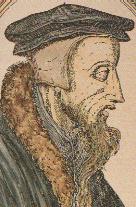Heroes of the Faith
Concise stories of significant Christian leaders
Concise stories of significant Christian leaders

 John Calvin
John Calvin1509-
————————————————————————
John Calvin was born on 10th July 1509 in Noyon, Picardy, some seventy kilometres north-east of Paris, the second son of Gerard Cauvin (Calvinus was the Latinised form of his name) and his wife Jeanne la France of Cambrai.
John was religiously inclined from an early age, and his father, a diocesan legal official, sent him to Parish University to take an arts degree in preparation for the priesthood. By John's graduation, however, his father had changed the plan and directed his son to Orleans University for legal studies.
Then came John's "sudden conversion" from papist prejudice to Protestant conviction, and this brought with it a spiritual quickening that made legal studies seem tame and dull by comparison with Scripture and theology. Soon Calvin was preaching, teaching, and pastoring informally among his peers, though his wish to enjoy a life of a leisured, learned, quiet-living Protestant Erasmus remained - as he wrote later, "literary ease, with something of a free and honourable station." In 1532 he produced a commentary on De Clementia of Seneca, a Stoic philosopher believed at that time to have had Christian sympathies. Calvin hoped that this would establish him as a humanist scholar. But this was not to be.
In 1534 the French Protestants were posting placards in the major towns attacking the Roman mass. Official persecution then threatened, and Calvin moved to Basel, where in March 1536 the first edition of his Institutes of the Christian Religion appeared. In the Preface, addressed to the King of France, Calvin stated, "My intention was only to furnish a kind of rudiments, by which those who feel some interest in religion might be trained to true godliness." His Preface was a fine apologia for the Protestant faith, and the six catechetical chapters into which his 516 small-format pages were divided (on the Law, the Creed, the Lord's Prayer, the dominical sacraments, false sacraments, and Christian liberty) were brilliantly written. The work was an immediate success, and it was as a distinguished young Protestant author that Calvin arrived in Geneva five months later.
In fact Calvin was on his way to Strasbourg when someone recognised him and too him to meet one of the leaders there, William Farel. Farel told Calvin he must stay and help, and when the latter pleaded other plans, he replied, "You are following only your own wishes, and I tell you, in the name of God Almighty, that if you do not help us in this work of the Lord, the Lord will punish you for seeking your own interests rather than his." So Calvin stayed and continued his Geneva ministry without a break (apart from three years of banishment between 1538 and 1541) till his death in 1564.
Calvin's goal in Geneva was a teaching, nurturing church, embracing the whole of society, and honouring God by orthodox praise and obedient holiness. There should be daily gatherings for psalm singing and expository preaching, monthly administration of the Lord's Supper (Calvin wanted this weekly but could never secure it), and an autonomous ecclesiastical court for censuring, and if necessary, excommunicating delinquent members.
Bible-centred in his teaching, God-centred in his living and Christ-centred in his faith, he integrated the confessional emphases of Reformation thought - by faith alone, by Scripture alone, by Christ alone, for God's glory alone - with clarity and strength. He was ruled by two convictions - that God is all and man is nothing; and that praise is due to God for everything good. Both convictions permeated his life, right up to his final direction that his tomb be unmarked and there be no speeches at his burial, lest he become the focus of praise instead of his God.
In the Institutes, Calvin uses the Biblical theme of the knowledge of God. Knowing God is religion, and what is known about God is theology. Both theology and religion are to be learned and taught from God's own teaching, i.e. from Holy Scripture. To know God means acknowledging him as he has revealed himself in Scripture and through Christ, worshipping him and giving him thanks, humbling oneself before him as a sinner and learning from his Word, loving the Father and the Son for their love in adoption and redemption, trusting the promises of pardon and glory that God has given in Christ, living in obedience to God's law, and seeking to honour God in all human relationships and all commerce with created things. This knowledge of God comes from the Holy Spirit, speaking in and through the written Word and uniting us to the risen Christ for new life.